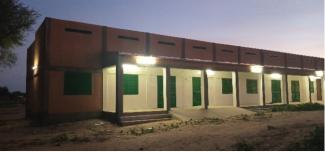Ensuring Continued Education for Internally Displaced Students in the Sahel Region
Since 2015, more than 2,300 schools across the Est, Nord, and Sahel regions have either closed or suffered damage due to violence and insecurity in Burkina Faso. Attacks and threats from violent extremist organizations (VEOs) in the Sahel region have caused many teachers and students to flee to more secure places, generally provincial capitals or urban centers. As a result, the Dori Provincial High School, located in the capital of the Sahel region, has received over 200 displaced students. This influx of students has overwhelmed schools, which are unable to accommodate the 1,800 students, with only 68 teachers and 21 administrative staff available to support.
In response to the overcrowding and lack of resources at Dori Provincial High School, the USAID/Office of Transition Initiatives’ (OTI) Burkina Faso Regional Program (BFRP) worked with the Regional Council of the Sahel Region, a local government body, in February 2021 to rehabilitate the school and ensure continued education for both host and displaced students. In total, three buildings were rehabilitated, which included five classrooms, study places, latrines, and administrative offices. USAID/OTI’s support also provided furniture, computer equipment, and solar powered lights to the school.
“With the new equipment, homework and lessons will be easy to manage, we [teachers] will no longer have to spend our money on printing documents or making copies for students,” said Dicko, a teacher at the school.
On August 7, the High Commissioner of Seno Province (representing the Governor of the Sahel region), the Mayor of Dori, and the Regional Director of Secondary Education (representing the Minister of Education) joined members of the school’s administration, parents, and students in a BFRP handover ceremony at the Dori Provincial High School.
According to members of the Parents' Association, school officials, and provincial education authorities, BFRP’s support has strengthened authorities’ abilities to respond to local education challenges. The support has also improved their credibility amongst the local population, because without it, many internally displaced students would be left without an education. The High Commissioner of Seno Province expressed satisfaction on behalf of Dori stakeholders and beneficiaries, welcomed BFRP’s support, and thanked the Regional Council and USAID for implementing such a valuable activity.

USAID/BFRP
